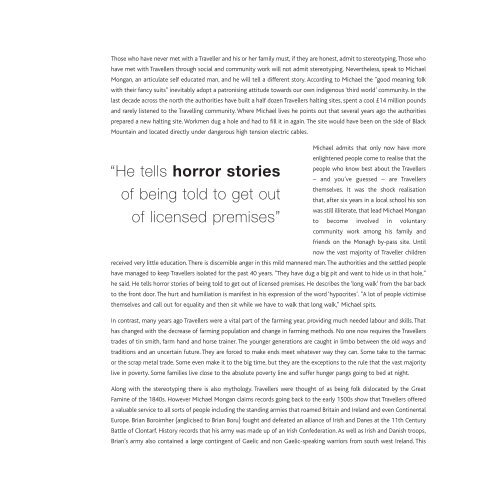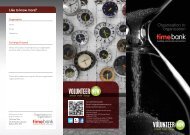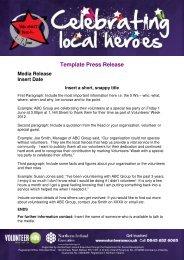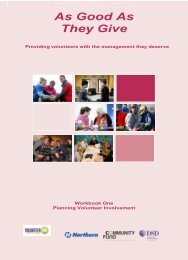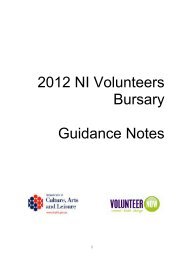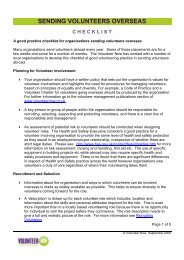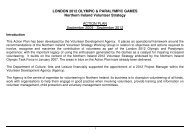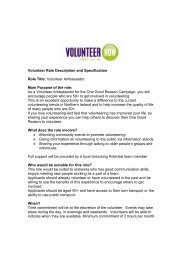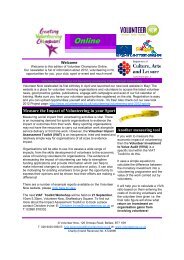Stories from the Edge - Volunteer Now
Stories from the Edge - Volunteer Now
Stories from the Edge - Volunteer Now
You also want an ePaper? Increase the reach of your titles
YUMPU automatically turns print PDFs into web optimized ePapers that Google loves.
Those who have never met with a Traveller and his or her family must, if <strong>the</strong>y are honest, admit to stereotyping.Those whohave met with Travellers through social and community work will not admit stereotyping. Never<strong>the</strong>less, speak to MichaelMongan, an articulate self educated man, and he will tell a different story. According to Michael <strong>the</strong> "good meaning folkwith <strong>the</strong>ir fancy suits" inevitably adopt a patronising attitude towards our own indigenous ‘third world’ community. In <strong>the</strong>last decade across <strong>the</strong> north <strong>the</strong> authorities have built a half dozen Travellers halting sites, spent a cool £14 million poundsand rarely listened to <strong>the</strong> Travelling community. Where Michael lives he points out that several years ago <strong>the</strong> authoritiesprepared a new halting site. Workmen dug a hole and had to fill it in again. The site would have been on <strong>the</strong> side of BlackMountain and located directly under dangerous high tension electric cables.Michael admits that only now have more“He tells horror storiesof being told to get outof licensed premises”enlightened people come to realise that <strong>the</strong>people who know best about <strong>the</strong> Travellers– and you’ve guessed – are Travellers<strong>the</strong>mselves. It was <strong>the</strong> shock realisationthat, after six years in a local school his sonwas still illiterate, that lead Michael Monganto become involved in voluntarycommunity work among his family andfriends on <strong>the</strong> Monagh by-pass site. Untilnow <strong>the</strong> vast majority of Traveller childrenreceived very little education. There is discernible anger in this mild mannered man. The authorities and <strong>the</strong> settled peoplehave managed to keep Travellers isolated for <strong>the</strong> past 40 years. "They have dug a big pit and want to hide us in that hole,"he said. He tells horror stories of being told to get out of licensed premises. He describes <strong>the</strong> ‘long walk’ <strong>from</strong> <strong>the</strong> bar backto <strong>the</strong> front door. The hurt and humiliation is manifest in his expression of <strong>the</strong> word ‘hypocrites’. "A lot of people victimise<strong>the</strong>mselves and call out for equality and <strong>the</strong>n sit while we have to walk that long walk," Michael spits.In contrast, many years ago Travellers were a vital part of <strong>the</strong> farming year, providing much needed labour and skills. Thathas changed with <strong>the</strong> decrease of farming population and change in farming methods. No one now requires <strong>the</strong> Travellerstrades of tin smith, farm hand and horse trainer. The younger generations are caught in limbo between <strong>the</strong> old ways andtraditions and an uncertain future. They are forced to make ends meet whatever way <strong>the</strong>y can. Some take to <strong>the</strong> tarmacor <strong>the</strong> scrap metal trade. Some even make it to <strong>the</strong> big time, but <strong>the</strong>y are <strong>the</strong> exceptions to <strong>the</strong> rule that <strong>the</strong> vast majoritylive in poverty. Some families live close to <strong>the</strong> absolute poverty line and suffer hunger pangs going to bed at night.Along with <strong>the</strong> stereotyping <strong>the</strong>re is also mythology. Travellers were thought of as being folk dislocated by <strong>the</strong> GreatFamine of <strong>the</strong> 1840s. However Michael Mongan claims records going back to <strong>the</strong> early 1500s show that Travellers offereda valuable service to all sorts of people including <strong>the</strong> standing armies that roamed Britain and Ireland and even ContinentalEurope. Brian Boroimher (anglicised to Brian Boru) fought and defeated an alliance of Irish and Danes at <strong>the</strong> 11th CenturyBattle of Clontarf. History records that his army was made up of an Irish Confederation. As well as Irish and Danish troops,Brian’s army also contained a large contingent of Gaelic and non Gaelic-speaking warriors <strong>from</strong> south west Ireland. This


